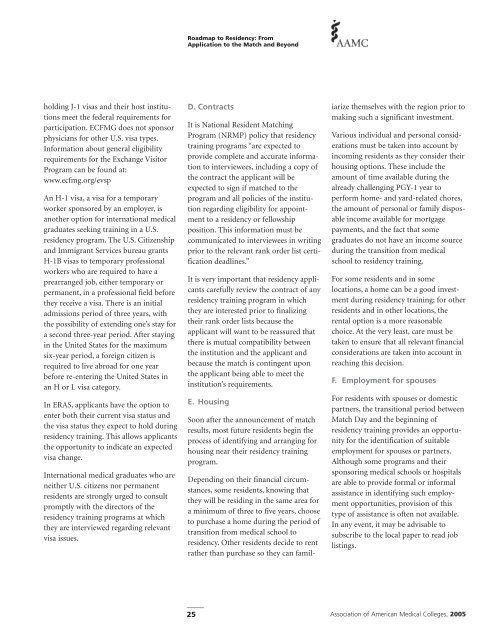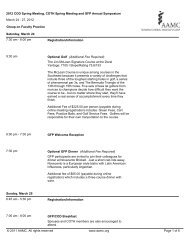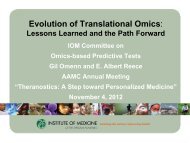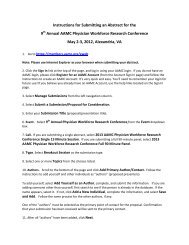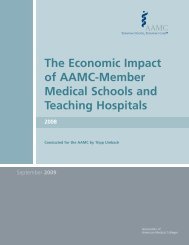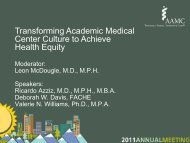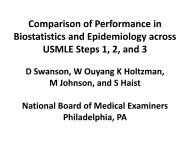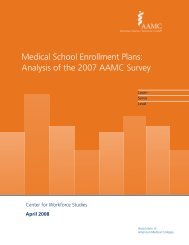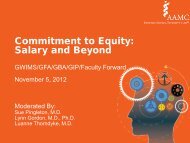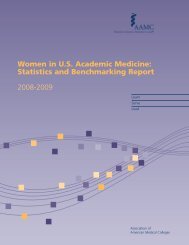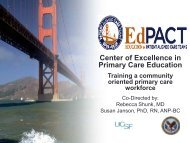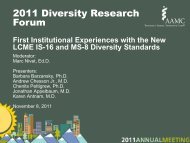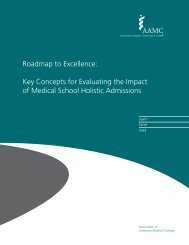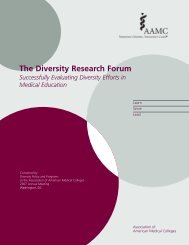Roadmap to Residency: - AAMC
Roadmap to Residency: - AAMC
Roadmap to Residency: - AAMC
Create successful ePaper yourself
Turn your PDF publications into a flip-book with our unique Google optimized e-Paper software.
<strong>Roadmap</strong> <strong>to</strong> <strong>Residency</strong>: FromApplication <strong>to</strong> the Match and Beyondholding J-1 visas and their host institutionsmeet the federal requirements forparticipation. ECFMG does not sponsorphysicians for other U.S. visa types.Information about general eligibilityrequirements for the Exchange Visi<strong>to</strong>rProgram can be found at:www.ecfmg.org/evspAn H-1 visa, a visa for a temporaryworker sponsored by an employer, isanother option for international medicalgraduates seeking training in a U.S.residency program. The U.S. Citizenshipand Immigrant Services bureau grantsH-1B visas <strong>to</strong> temporary professionalworkers who are required <strong>to</strong> have aprearranged job, either temporary orpermanent, in a professional field beforethey receive a visa. There is an initialadmissions period of three years, withthe possibility of extending one’s stay fora second three-year period. After stayingin the United States for the maximumsix-year period, a foreign citizen isrequired <strong>to</strong> live abroad for one yearbefore re-entering the United States inan H or L visa category.In ERAS, applicants have the option <strong>to</strong>enter both their current visa status andthe visa status they expect <strong>to</strong> hold duringresidency training. This allows applicantsthe opportunity <strong>to</strong> indicate an expectedvisa change.International medical graduates who areneither U.S. citizens nor permanentresidents are strongly urged <strong>to</strong> consultpromptly with the direc<strong>to</strong>rs of theresidency training programs at whichthey are interviewed regarding relevantvisa issues.D. ContractsIt is National Resident MatchingProgram (NRMP) policy that residencytraining programs “are expected <strong>to</strong>provide complete and accurate information<strong>to</strong> interviewees, including a copy ofthe contract the applicant will beexpected <strong>to</strong> sign if matched <strong>to</strong> theprogram and all policies of the institutionregarding eligibility for appointment<strong>to</strong> a residency or fellowshipposition. This information must becommunicated <strong>to</strong> interviewees in writingprior <strong>to</strong> the relevant rank order list certificationdeadlines.”It is very important that residency applicantscarefully review the contract of anyresidency training program in whichthey are interested prior <strong>to</strong> finalizingtheir rank order lists because theapplicant will want <strong>to</strong> be reassured thatthere is mutual compatibility betweenthe institution and the applicant andbecause the match is contingent uponthe applicant being able <strong>to</strong> meet theinstitution’s requirements.E. HousingSoon after the announcement of matchresults, most future residents begin theprocess of identifying and arranging forhousing near their residency trainingprogram.Depending on their financial circumstances,some residents, knowing thatthey will be residing in the same area fora minimum of three <strong>to</strong> five years, choose<strong>to</strong> purchase a home during the period oftransition from medical school <strong>to</strong>residency. Other residents decide <strong>to</strong> rentrather than purchase so they can familiarizethemselves with the region prior <strong>to</strong>making such a significant investment.Various individual and personal considerationsmust be taken in<strong>to</strong> account byincoming residents as they consider theirhousing options. These include theamount of time available during thealready challenging PGY-1 year <strong>to</strong>perform home- and yard-related chores,the amount of personal or family disposableincome available for mortgagepayments, and the fact that somegraduates do not have an income sourceduring the transition from medicalschool <strong>to</strong> residency training.For some residents and in somelocations, a home can be a good investmentduring residency training; for otherresidents and in other locations, therental option is a more reasonablechoice. At the very least, care must betaken <strong>to</strong> ensure that all relevant financialconsiderations are taken in<strong>to</strong> account inreaching this decision.F. Employment for spousesFor residents with spouses or domesticpartners, the transitional period betweenMatch Day and the beginning ofresidency training provides an opportunityfor the identification of suitableemployment for spouses or partners.Although some programs and theirsponsoring medical schools or hospitalsare able <strong>to</strong> provide formal or informalassistance in identifying such employmen<strong>to</strong>pportunities, provision of thistype of assistance is often not available.In any event, it may be advisable <strong>to</strong>subscribe <strong>to</strong> the local paper <strong>to</strong> read joblistings.25Association of American Medical Colleges, 2005


